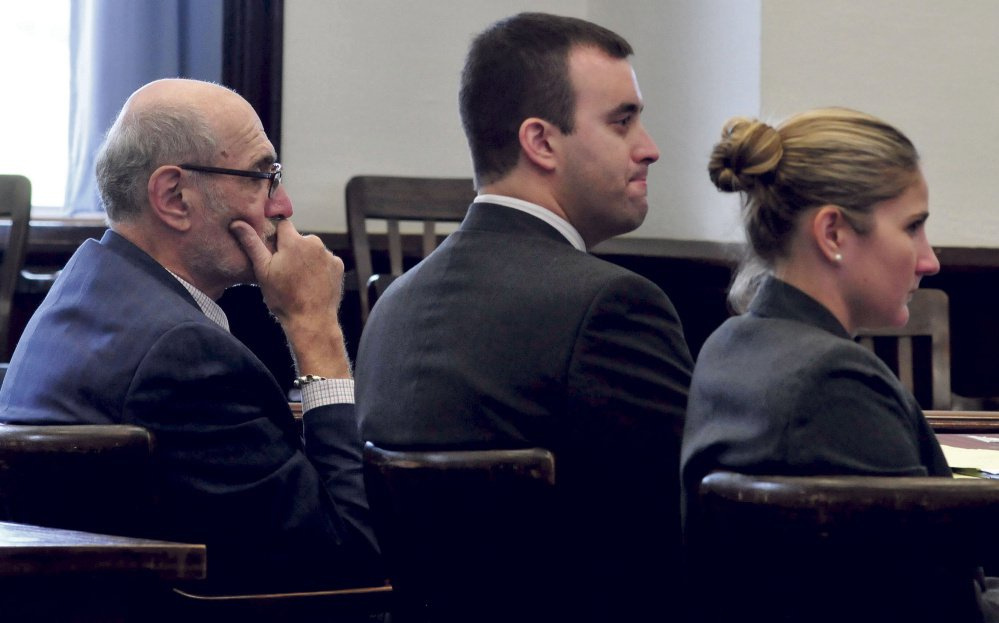Lawyers for a former Nokomis Regional High School music teacher serving time in prison for aggravated assault and domestic violence assault have filed an appeal to the state’s highest court.
Attorneys Leonard Sharon, of Auburn, and Elliot Epstein, of Lewiston, filed the appeal in March with the Maine Supreme Judicial Court, saying that the court erred in the trial of Andrew Maderios, who was convicted on two counts of felony aggravated assault and two counts of domestic violence assault. They are asking the court to toss out the conviction and to send the case back to superior court for a new trial.
Maderios was tried on nine charges, and the convictions were on charges related to attacks recorded by the victim, who was his live-in girlfriend at the time, on her cellphone.
Maderios, 29, formerly of Pittsfield, was sentenced to 15 years, with all but three years suspended, and six years of probation, with the first two of those years to include electronic monitoring. Maderios is serving the three years in prison and is ordered to wear an electronic monitoring bracelet for two years after his release.
The lawyers contend that the court was in error when the trial judge excluded evidence of the victim’s prior “vindictive” conduct that would have revealed her motive for bringing charges against Maderios and the court’s denial of a motion for a new trial based on that information, according to court documents.
The lawyers also say the court was mistaken in admitting at trial what they call “secondary evidence” of photographs of the victim’s injuries and the audio recordings the victim made of the attacks.
A third point of the appeal is based on the opinion of the lawyers that the judge failed to declare a mistrial based on what they see as “improper comments” made by District Attorney Maeghan Maloney, who prosecuted the case, during Maloney’s closing argument to the jury. They say Maloney stated her personal opinion about or “vouched for” the witness in an attempt to sway the jury.
Maloney this week said the appeal arguments made by Maderios’ lawyers are without merit. She said the first two points of the appeal — the trial judge refusing to admit evidence of prior conduct and assertions that the audio records were edited copies of original audio — already were addressed and dismissed by Justice Robert Mullen, both in pre-trial motions and in Sharon’s motion for a new trial.
She said the “level of discretion” given to a trial court judge is high and the supreme court takes that into consideration if addressing appeals.
“I’m still responding to every point made. I take it very seriously,” Maloney said. “Both of those issues I consider to have been decided by the trial court judge, (who) decided correctly; and (they were) looked at twice already, and I support the decision of the judge.”
As for her comments to the jury, Maloney said such a claim is common and kind of a default allegation in seeking a new trial.
“It’s a catch-all that’s put at the end of a defense attorney’s law court brief,” she said. “I still take it seriously, I still respond to it, but I don’t believe there was anything incorrect that rises to the level of giving Mr. Maderios a new trial.”
She said her comments were all based on testimony and evidence produced at trial and are allowed.
The victim documented the attacks at the Pittsfield home the couple shared with audio recordings and still photographs, all on her iPhone, which became key evidence in the five-day trial. Maderios was charged with beating, kicking and strangling his girlfriend at the time over several months, from December 2013 to July 2014. The Morning Sentinel is not revealing the woman’s name because she is the victim of domestic violence.
Sharon had argued during the trial that new evidence showed the victim had made similar claims of abuse against another man, her former husband. Sharon alleged that the victim set Maderios up and that evidence from the former husband saying she had done the same thing to him supports Maderios’ defense.
“In the case before the court, the defense offered evidence that (the victim), in the course of the breakup of three previous long-term relationships, had vindictively threatened and acted to deprive the men with whom she had been intimately involved of their careers, freedom and property — precisely the kind of conduct described by Maderios,” the lawyers wrote in their law court brief.
Mullen said his ruling on Aug. 31 not to accept statements of “prior bad acts” by the victim would stand.
Doug Harlow — 612-2367
Twitter:@Doug_Harlow
Send questions/comments to the editors.




Success. Please wait for the page to reload. If the page does not reload within 5 seconds, please refresh the page.
Enter your email and password to access comments.
Hi, to comment on stories you must . This profile is in addition to your subscription and website login.
Already have a commenting profile? .
Invalid username/password.
Please check your email to confirm and complete your registration.
Only subscribers are eligible to post comments. Please subscribe or login first for digital access. Here’s why.
Use the form below to reset your password. When you've submitted your account email, we will send an email with a reset code.